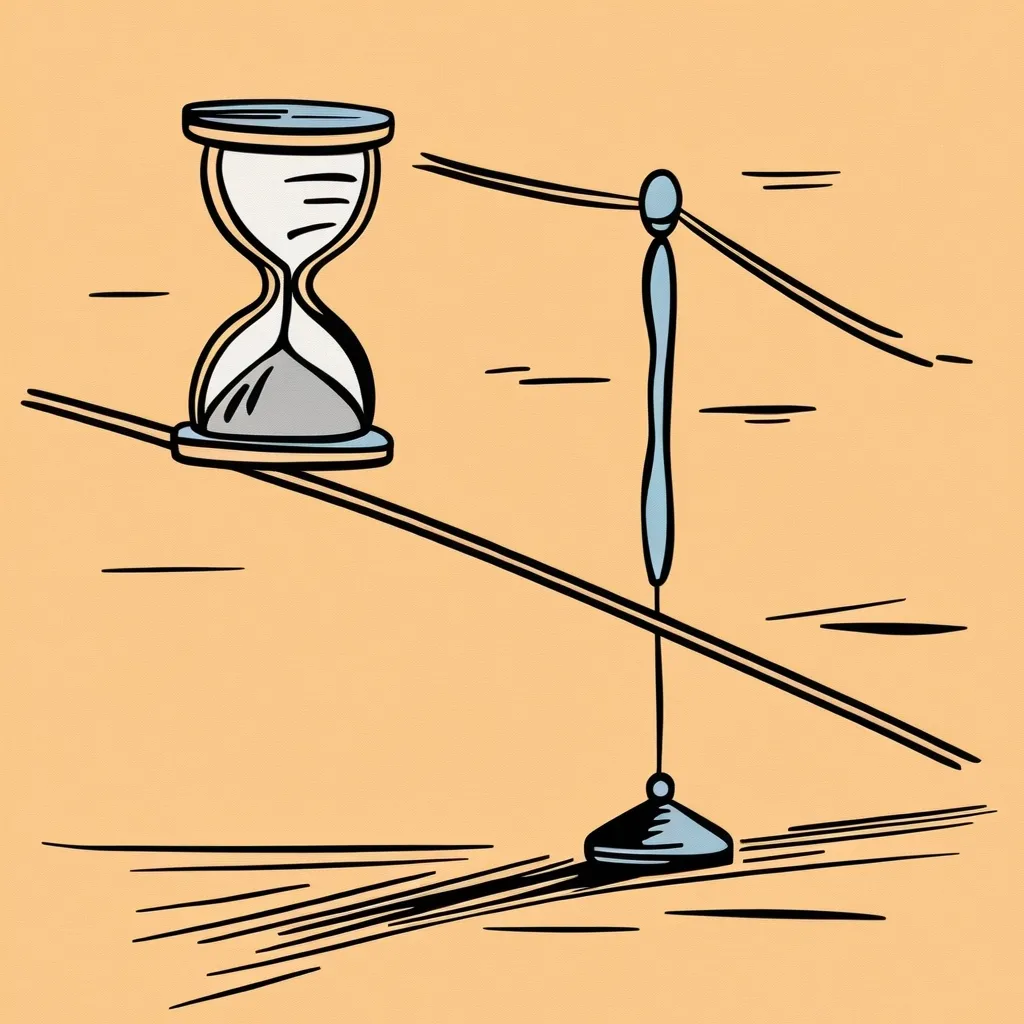Time is money, they say. But when it comes to decision-making, time can be a tricky beast to tame. We’re all guilty of choosing instant gratification over long-term rewards at times. It’s like picking that $100 now instead of waiting for $200 in six months. Our brains are wired to want things ASAP, even if it’s not the smartest move.
Think about splurging on a new gadget instead of paying off debt. That shiny new toy feels way better in the moment than slowly chipping away at a loan balance. Our brains play tricks on us, making immediate rewards seem way more valuable than they really are. It’s like they’re wearing beer goggles, but for instant gratification.
But here’s the thing - how we perceive time can mess with our heads too. Breaking down a long wait into smaller chunks can actually make it feel longer. Weird, right? It’s called the “time unpacking effect.” So thinking about waiting six individual months feels more brutal than just lumping it together as half a year.
Our emotions get all tangled up in this temporal decision-making business too. Waiting for something awesome, like a vacation, can actually be kind of fun and exciting. But waiting for something not-so-great, like a root canal? Pure torture. Managing those feelings can help us make smarter choices about immediate vs. delayed rewards.
So how do we outsmart our impulsive brains and make decisions that’ll actually benefit us long-term? There are a few tricks we can try. Visualizing our goals can be a powerful motivator. Picture yourself debt-free, or crushing that marathon, or retiring early. Make it vivid and real in your mind.
We can also train ourselves to delay gratification, like a muscle. Start small - put off that afternoon snack for an hour. Work your way up to bigger delays. Having an accountability buddy can help too. Tell a friend about your goals and ask them to check in on your progress. Sometimes we need that extra push to stay on track.
Automating decisions is another sneaky way to bypass our impulsive tendencies. Set up automatic transfers to savings or investments. Schedule those recurring bills. That way, your future self is taken care of without you having to make the choice over and over.
Here’s a cool rule to try: the 10-10-10 rule. When you’re faced with a decision, think about how it’ll impact you in 10 minutes, 10 months, and 10 years. It helps put things in perspective and keeps you focused on the big picture.
Speaking of the big picture, it’s wild how our thinking changes as events get closer. When we’re planning way ahead, we focus on the overall benefits and goals. But as it gets nearer, we start obsessing over the nitty-gritty details. It’s called “temporal construal levels” - fancy name for a pretty relatable experience.
Think about planning a big hike. Months in advance, you’re all about the health benefits and epic views. But the night before? You’re stressing about waking up early and how sore your legs are gonna be. By understanding this shift, we can plan better and be kinder to our future selves.
Here’s a pro tip: when you’re planning something, try to zoom in on the specifics. What obstacles might pop up? What details are you overlooking? It’ll help you make more realistic plans. And while you’re at it, try to envision the tough stuff ahead of time. That way, you can set yourself up for success by clearing as many hurdles as possible before you even start.
This temporal decision-making stuff isn’t just theoretical - it has real-world applications that can seriously impact your life. Take finances, for example. Understanding how we discount future rewards can help us resist the urge to blow our bonus on something frivolous. Instead, we might invest it or pay down high-interest debt. Future you will be doing a happy dance, trust me.
It’s not just about money, though. This mindset can revolutionize your health choices too. When you’re tempted to skip a workout or inhale a pint of ice cream, focusing on long-term health benefits can help you stay on track. It’s about playing the long game, even when your brain is screaming for immediate satisfaction.
At the end of the day, mastering temporal decision-making is all about finding that sweet spot between what you want now and what’s best for you in the long run. It’s not easy - our brains are pretty set in their ways. But by understanding the psychological and emotional factors at play, we can develop strategies to overcome our impulses.
Whether it’s visualizing goals, practicing delayed gratification, or automating our choices, there are tons of ways to align our decisions with our long-term best interests. The key is staying aware of our tendencies and planning ahead with a clear vision of where we want to end up.
Remember, it’s not just about valuing time - it’s about valuing yourself and your future. By making informed, patient decisions, you’re investing in a more fulfilling and purposeful life. It might not always feel great in the moment, but trust me, future you will be incredibly grateful.
So next time you’re faced with a choice between instant gratification and a bigger future reward, take a step back. Think about where you want to be in the long run. Visualize your goals. Consider the 10-10-10 rule. And remember, you’re not just making a decision for right now - you’re shaping your future, one choice at a time.
It’s a journey, and like any journey, there will be bumps along the way. You might slip up and choose the immediate reward sometimes. That’s okay - we’re all human. The important thing is to learn from those moments and keep pushing forward. Each time you choose the long-term benefit over the quick fix, you’re building a stronger, more resilient future self.
Think of it like compound interest, but for decision-making. Each good choice builds on the last, creating a snowball effect of positive outcomes. It might not feel like much in the moment, but over time, those choices add up to major life changes.
And here’s the cool part - as you get better at this temporal decision-making thing, it gets easier. Your brain actually rewires itself, making it more natural to consider long-term consequences. It’s like building any other skill - the more you practice, the more automatic it becomes.
So don’t get discouraged if it feels tough at first. Keep at it. Celebrate the small victories. Did you choose to save instead of splurge? Pat yourself on the back. Opted for a healthy meal instead of fast food? That’s a win. Recognizing and appreciating these moments will help reinforce the behavior.
Remember, you’re playing the long game here. It’s not about perfection - it’s about progress. Each decision is an opportunity to invest in your future self. So take a deep breath, think it through, and trust that you’re making the best choice for the long haul.
You’ve got this. Your future self is cheering you on, ready to reap the benefits of all your smart decisions. So go ahead, make them proud. Your best life is waiting - it’s just a series of good choices away.






